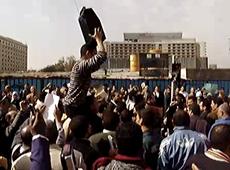Social media as a tool for protest
04 Feb 2011
Internet services were reportedly restored in Egypt on Feb. 2 after being completely shut down for two days. Egyptian authorities unplugged the last Internet service provider (ISP) still operating Jan. 31 amidst ongoing protests across the country. The other four providers in Egypt - Link Egypt, Vodafone/Raya, Telecom Egypt and Etisalat Misr - were shut down as the crisis boiled over on Jan. 27. Commentators immediately assumed this was a response to the organizational capabilities of social media websites that Cairo could not completely block from public access.
 The role of social media in protests and revolutions has garnered considerable media attention in recent years. Current conventional wisdom has it that social networks have made regime change easier to organize and execute. An underlying assumption is that social media is making it more difficult to sustain an authoritarian regime - even for hardened autocracies like Iran and Myanmar - which could usher in a new wave of democratization around the globe. In a Jan. 27 YouTube interview, US. President Barack Obama went as far as to compare social networking to universal liberties such as freedom of speech.
The role of social media in protests and revolutions has garnered considerable media attention in recent years. Current conventional wisdom has it that social networks have made regime change easier to organize and execute. An underlying assumption is that social media is making it more difficult to sustain an authoritarian regime - even for hardened autocracies like Iran and Myanmar - which could usher in a new wave of democratization around the globe. In a Jan. 27 YouTube interview, US. President Barack Obama went as far as to compare social networking to universal liberties such as freedom of speech.
Social media alone, however, do not instigate revolutions. They are no more responsible for the recent unrest in Tunisia and Egypt than cassette-tape recordings of Ayatollah Ruholla Khomeini speeches were responsible for the 1979 revolution in Iran. Social media are tools that allow revolutionary groups to lower the costs of participation, organization, recruitment and training. But like any tool, social media have inherent weaknesses and strengths, and their effectiveness depends on how effectively leaders use them and how accessible they are to people who know how to use them.
How to use social media
The situations in Tunisia and Egypt have both seen an increased use of social networking media such as Facebook and Twitter to help organize, communicate and ultimately initiate civil-disobedience campaigns and street actions. The Iranian ''Green Revolution'' in 2009 was closely followed by the Western media via YouTube and Twitter, and the latter even gave Moldova's 2009 revolution its moniker, the ''Twitter Revolution.''
Foreign observers - and particularly the media - are mesmerized by the ability to track events and cover diverse locations, perspectives and demographics in real time. But a revolution is far more than what we see and hear on the Internet - it requires organization, funding and mass appeal. Social media no doubt offer advantages in disseminating messages quickly and broadly, but they also are vulnerable to government counter-protest tactics (more on these below). And while the effectiveness of the tool depends on the quality of a movement's leadership, a dependence on social media can actually prevent good leadership from developing.
The key for any protest movement is to inspire and motivate individuals to go from the comfort of their homes to the chaos of the streets and face off against the government. Social media allow organizers to involve like-minded people in a movement at a very low cost, but they do not necessarily make these people move. Instead of attending meetings, workshops and rallies, un-committed individuals can join a Facebook group or follow a Twitter feed at home, which gives them some measure of anonymity (though authorities can easily track IP addresses) but does not necessarily motivate them to physically hit the streets and provide fuel for a revolution. At the end of the day, for a social media-driven protest movement to be successful, it has to translate social media membership into street action.



















